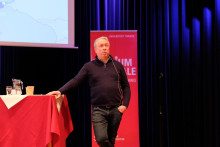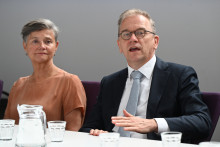 |
| Yujie Ma working in the lab. (Foto: Gijs van Ouwerkerk) |
The prestigious Chinese award carries a cash prize of 5,000 USD along with a certificate, and remarkably, Ma is one of only three Chinese students, based in the Netherlands, to be conferred this honor. Here are some excerpts from an interview with Ma, who is married and comes from the city of Wuhan in China:
How did you and those around you react to this award?
`I felt pretty excited and happy. My family and my professor are really proud of this achievement.'
What are the criteria for receiving this award?
`One has to apply for this award with verification of the self-financed nature of his or her study. Most PhD students fall under the self-financed category-even though they receive a salary. Recommendation from the supervising professor should be sent with the application. But the most important criteria, of course, is what one has accomplished in a specific research area with special focus on the applicant's publications and the number of citations as well as the impact factor of the journals in which the work was published.'
Is there any perceptible change in your stature in academia after getting this award?
`Well, as far as the UT is concerned, more people know me now. But as far as the academic community outside of the UT is concerned, nothing has changed. It has been only two months since I won this award.'
Which research group do you work for and what is your research area?
`I work in the Material Science and Technology of Polymers group that is chaired by Professor Julius Vancso. My research, broadly speaking, deals with the application of material science, especially polymers, in nanotechnology. To be more specific, I am dealing with nanofabrication through the supramolecular assembly of polyelectrolytes.'
Could you shed some light on your educational background prior to your tenure at the UT?
`I finished my bachelor's and my master's degrees at Shanghai Jiao Tong University. During my master's program, between 2002 and 2003, I was also an exchange student at the UT and attended international master's courses in Chemical Engineering. As a result, I obtained two master's degrees.'
How would you compare the research environment in China and the Netherlands?
`As far as research is concerned, I think there is much more freedom here. In addition, since my group is embedded in the MESA+ Institute, I am exposed to valuable information from many disciplines. This shapes one's scientific perspective. When I was studying in China, the syllabus was almost one-dimensional. But then, let us not forget that it has been four years since I finished my master's degree in China and things have changed dramatically during this period. I am pretty sure that the current situation in China is more conducive to research and multi-disciplinary studies than four years ago.'
Do you enjoy living here in the Netherlands?
`Life here is quite good. I especially like the fresh air! But I must say that I really miss the real Chinese food. Eventually I will consider returning to China, not just for the food, but also due to the career prospects resulting from my country's explosive growth.'
What is your favorite pastime?
`I like movies! I watch all kinds of movies, with a special preference for European and American movies. Besides movies, I love to travel.'







